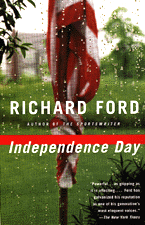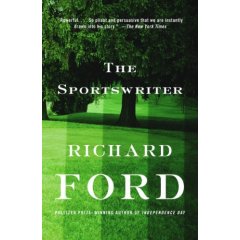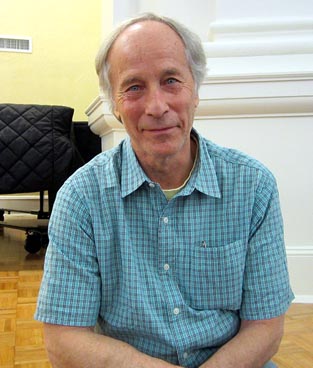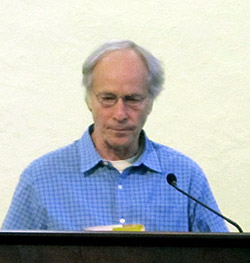Major Works
Novels
- And I Am in Retirement from Love: A novel (In progress 2018)
- Canada (2013)
- The Lay of the Land (2006)
- Independence Day (1996)
- Wildlife (1990)
- The Sportswriter (1986)
- The Ultimate Good Luck (1981)
- A Piece of My Heart (1976)
Short Story and Novella Collections
- Sorry for Your Trouble: Stories (2020)
- The Irish in America: A collection of short stories, (in progress)
- Let Me Be Frank with You: a Frank Bascombe Book (2014) 4 Novellas
- Blue Collar, White Collar, No Collar: Stories of Work , editor (2011)
- Vintage Ford (2004)
- A Multitude of Sins (2002)
- Women with Men (1997)
- Rock Springs (1987)
Memoir
- Between Them: Remembering My Parents (2017)
Collaborative Portfolio
- Privacy (with seven etchings by artist Jane Kent)
Biography of Richard Ford
by Brandon Patton (SHS) 1999
Richard Ford, a Mississippi novelist and short story writer who in 1996 won the Pulitzer Prize for Literature and the PEN/William Faulkner Award for Independence Day, was born in Jackson, Mississippi, on February 16, 1944. He is the son of Parker Carrol Ford, a traveling salesman who was seldom home because he sold laundry starch to wholesale grocer companies in seven Southern states, and Edna Ford, a stay-at-home mother. His parents moved from Little Rock, Arkansas, just before Richard Ford was born. His father died of a heart attack in 1960 when Ford was 16, and his mother died of cancer in 1981. He writes about them in his memoir Between Them. Growing up, Ford went to Davis Elementary in Jackson, the same elementary school famous Mississippi writer Eudora Welty once attended. He even had some of the same teachers. He lived in Jackson across Congress Street from where Eudora had lived until 1928 — when the Weltys moved to Pinehurst Street. In August of 2001, author Ford was a pallbearer at Eudora Welty’s funeral. Until the death of Eudora Welty, Ford was the literary executor of her work, charged with making editorial decisions about her works. Both Welty and Ford not only have the same elementary school in common (although years apart–Ford was 57 and Welty was 92 when she died) but also the Pulitzer Prize!
After Ford graduated from high school in Jackson, Mississippi, he went on to get his B.A. from Michigan State University in 1966 and his M. F. A. from the University of California. In 1968 he married Kristina Hensley. They have no children. Ford wrote short stories for Esquire, The Paris Review, and The New Yorker and others before completing his first novel, A Piece of My Heart, in 1976. Ford followed with more novels such as The Ultimate Good Luck (1981), The Sportswriter (1986), Wildlife (1990), and Independence Day (1995). He has also written several collections of short stories.
Ford has won more than 35 honors and awards and is a member of the Writers Guild. Some of his awards include a Guggenheim Fellowship, a National Endowment for the Arts Fellowship, the PEN/Faulkner citation for fiction for The Sportswriter, in addition to the the PEN/Faulkner Award and the Pulitzer for Literature for his novel Independence Day. With these awards and novels, Richard Ford has become one of the best-known authors from Mississippi. He published a collection of three short stories called Women with Men in the summer of 1997. In April of 2000 he collaborated with Jane Kent to publish a portfolio of seven etchings with letterpress text and his short story Privacy.
In 2007, Richard Ford published The Lay of the Land, which became a National Book Critics Circle Award Finalist and A New York Times Best Book of the Year. It continues the story of Ford’s main character Frank Bascombe.
Winner of the Rea Award for the Short Story and 2001 PEN/Malamud Award, Ford was for a time Writer-in-Residence at the Oscar Wilde Centre in the School of English at Trinity College, Dublin, Ireland, where he taught in the master’s program in creative writing. In 2011 he assumed the post of senior fiction professor at the University of Mississippi, replacing the late Mississippi writer Barry Hannah. He has been a professor, visiting professor, lecturer, or assistant professor at more than seven colleges and universities. He has also written numerous essays and a play and screenplay. His novel, Canada, was published in 2012. In 2013 Richard Ford was awarded the Mississippi Institute of Arts and Letters Award for fiction. He published Let Me Be Frank with You in 2014.
He is the Mellon Professor of the Humanities at the Columbia University School of the Arts and currently (2018) lives in East Boothbay, Maine.
Reviews
A Review of Independence Day
by Park Zhou (SHS)
 Independence Day by Richard Ford is a powerful and exhilarating novel. The book is a sequel to The Sportswriter. The narrator, Frank Bascombe, a former sportswriter, is divorced and lives in Haddam, New Jersey. A real estate agent, Frank is going through what he calls “the Existence Period.” Meanwhile his ex-wife, Ann, has married Charley O’Dell, an architect . She is now Mrs. Charley O’Dell of 86 Swallow Lane, Deep River, CT. Both his children live there too, though as Frank says, “I’m not certain how happy they are or even should be” (7). Frank’s 15-year-old son, Paul, is an emotionally troubled teenager who faces a court date for shoplifting.
Independence Day by Richard Ford is a powerful and exhilarating novel. The book is a sequel to The Sportswriter. The narrator, Frank Bascombe, a former sportswriter, is divorced and lives in Haddam, New Jersey. A real estate agent, Frank is going through what he calls “the Existence Period.” Meanwhile his ex-wife, Ann, has married Charley O’Dell, an architect . She is now Mrs. Charley O’Dell of 86 Swallow Lane, Deep River, CT. Both his children live there too, though as Frank says, “I’m not certain how happy they are or even should be” (7). Frank’s 15-year-old son, Paul, is an emotionally troubled teenager who faces a court date for shoplifting.
The novel begins on a Fourth of July weekend as Frank is trying to close a house sale. Frank’s clients, the Markhams, are an indecisive couple from Vermont who are not satisfied with anything. “The house I could show them all fell significantly below their dream” (39). Actually, the Markhams never really want to buy a house; they just want “reality to set in.”
Just as Frank is ready to spend his evening with his sometime lover, Sally Caldwell, he receives a message from his ex-wife. It turns out that Paul has whacked his stepfather in the jaw with an oarlock. Frank decides to take Paul for a father-son trip to visit the Basketball Hall of Fame in Springfield, Massachusetts, and the Baseball Hall of Fame in Cooperstown, New York. The trip at first is quite successful as Frank tries to get his son to regain his interest in life and forget about all the troubles. “It’s totally relevant–in my view–to Paul’s difficulty in integrating his fractured past with his hectic present so that the two connect up in a commonsense way and make him free and independent rather than staying disconnected and distracted and driving him crazy” (259). Tragedy soon hits, however, as Paul gets knocked in the eye by a baseball going 75 miles-per-hour. Frank states, “Paul . . . turns his face to the machine, which, having no brain, or heart, or forbearance, or fear . . . squeezes another ball through its dark warp . . . and hit my son full in the face and knocks him flat down on his back with a terrible, loud thwock “(361). Even though he is a good father, Frank is reluctant to have a solid commitment with the women in his life. “‘And you’re noncommittal . . . You’re smooth and you’re cautious and you ‘re noncommittal. That’s not a very easy combination for me'” (272).
The novel stresses the idea of personal independence. Both Frank and Paul try to obtain independence from the nightmares which hold them captive. Frank has gone through a son’s death, a divorce, and the ruin of his sportswriting career. Similarly, Paul has to face his parents’ divorce, the death of his brother, and the death of his dog, Mr. Toby. The book itself, however, is lengthy and exhausting. It is perfect for someone who has a lot of patience and time. Still, Independence Day is an astonishing novel with compelling characters.
A Review of The Sportswriter
by Brandon Patton (SHS)
Richard Ford’s fiction novel, The Sportswriter, is a definite page turner. This novel is written in first person and is an example of  great character development. This novel is full of life and a great achievement for Ford. This is a book anyone can relate to–it’s the sport everyone plays.
great character development. This novel is full of life and a great achievement for Ford. This is a book anyone can relate to–it’s the sport everyone plays.
Frank Bascombe is the sportswriter who lives in suburban New Jersey. This story takes place during Easter week in 1986. Frank and his ex-wife decide to meet at a graveyard to visit their deceased son Ralph. When this meeting is over , the reader begins to discover what kind of man Frank Bascombe really is. I got the impression that Frank was a man without any morals because he was constantly talking about hundred dollar whores . Frank finally does meet a lady; her name is Vicki. He takes Vicki on a business trip to Detroit where they spend about two days. Frank begins to fall in love with Vicki on this trip. As he gets arrives back in New Jersey, he calls a woman named Selma Jassim. While he is standing in the phone booth talking, a young man hits a shopping cart which flies into the phone booth, shattering one side of the glass and cutting Frank. Frank on his way home runs into an eighteen year old girl, who helps stop the bleeding from his cuts. They start a conversation about her career goals. Frank shows a different side of himself by saying, “Well, I’ll make some calls and help you out.”
This was one of the best novels I’ve read in a longtime. The character development is so great that you can’t help but turn the pages. If you haven’t read The Sportswriter by Richard Ford, it’s definitely one to read.
A Review of Wildlife
by Phillip Murphy (SHS)
 Richard Ford’s coming of age novel Wildlife tells the story of sixteen year-old Joe Brinson and his family’s struggles. In this novel, Joe Brinson is living in a new place and does not have many friends. He is close to each one of his parents. He is especially close to his father Jerry, who is Joe’s best friend. Things start to unravel when Joe’s father loses his job. His father then leaves to go fight a raging forest fire near their home. While he is gone, Joe’s mother has an affair with a man named Warren Miller. When Joe’s father returns home three days later, his wife tells him what she has done. Jerry then goes over to Warren Miller’s house and promptly sets it on fire. In the very end of the book, Warren decides not to press charges against Joe’s father, and that is where the book ends.
Richard Ford’s coming of age novel Wildlife tells the story of sixteen year-old Joe Brinson and his family’s struggles. In this novel, Joe Brinson is living in a new place and does not have many friends. He is close to each one of his parents. He is especially close to his father Jerry, who is Joe’s best friend. Things start to unravel when Joe’s father loses his job. His father then leaves to go fight a raging forest fire near their home. While he is gone, Joe’s mother has an affair with a man named Warren Miller. When Joe’s father returns home three days later, his wife tells him what she has done. Jerry then goes over to Warren Miller’s house and promptly sets it on fire. In the very end of the book, Warren decides not to press charges against Joe’s father, and that is where the book ends.
Ford tries to keep the reader interested in his boring novel, but he does not do a very good job of it. He put in too many unnecessary things. Although he provided a few amusing anecdotes in his book, the boring, unnecessary parts out-weigh the interesting ones. Also, I am not big on books filled with affairs of wives cheating on husbands and vice versa. I did like Ford’s use of irony in this novel. It was rather amusing the way Joe’s father went off to fight fires to help his community out and then returned to set a man’s house ablaze. Other than that part, the novel seemed dull. This is a good book for people who like to read somewhat slow-paced novels with few humorous insights in it.
Related Websites
- from The New Yorker “Brush Clearing with Teen-age Boys in Arkansas” by Richard Ford, June, 2017..
- Writers at Guild Hall 1996 announce Ford wins both Pulitzer and PEN/William Faulkner Award.
- Information about Vintage Ford. Amazon.com, 2004
- Essay written by Richard Ford about then candidate Donald Trump
- Richard Ford, The Art of Fiction No. 147. Interviewed by Bonnie Lyons. The Paris Review.
- News about Richard Ford. The New York Times.
Bibliography
- “1996 Pulitzer Prizes Announced.” Bookweb. December13,1996.
http://www.bookweb.org/news/btw/288.html - Bowden, Jane A., ed. “Richard Ford.” Contemporary Authors. vol. 69-72. Detroit, MI: Gale Research Company, 1978. 243.
- Clay, John. “Richard Ford Reference.” Gunnar Bittersmann. December 1, 1996. (user.cs.tu-berlin.de/~gunnar/bruce/lt/1995.3/0062.html).
- Contemporary Authors. New Revision Series. Volume 11. 211.
- Cryer, Dan. “Independence Day.” Newsday Direct. December 3, 1996. http://www.newsday.com/books/bkindep.htm).
- Ford, Richard. Wildlife. New York: Atlantic Monthly Press, 1990.
- Marowski, Daniel G., and Roger Matuz, ed. “Richard Ford.” Contemporary Literary Criticism. Vol. 46. Detroit, MI: Gale Research Company, 1988. 156.
- “Richard Ford ‘s Novel Independence Day Takes PEN/Faulkner Along with Pulitzer.” Virtually Northwest. December 3, 1996.



